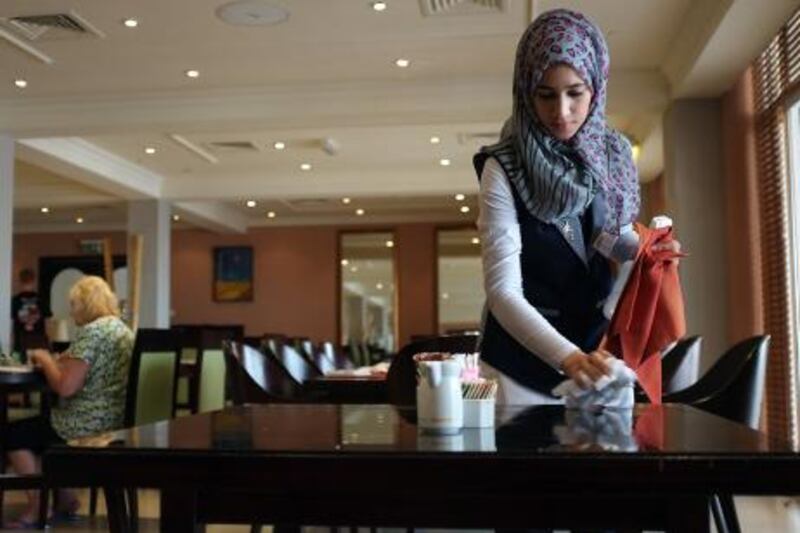"The journey of a thousand miles starts with one step," says an ancient proverb.
In my case, it started with a foot pressed on the pedal.
For the Arab women I met on the way, their journey began by overcoming a sense of shame and taking up jobs that until recently were unthinkable.
Picture gallery: The land of Sinbad the sailor
To view more pictures from Oman click on the image above.
Earlier this week, a colleague and I drove to Oman, following the route travelled by people of Arabia for centuries, heading to Salalah in Dhofar region to escape the heat. As heat descends on the peninsula, Salalah enjoys refreshing weather during its monsoon season that lasts from June to September.
Our first stop was in Muscat, where we met young Arab women being trained as waitresses at one of the major hotels. As one of them cleared our table, I couldn't help but ask if she was Omani. She said yes, with a shy smile.
"How do you like it?" I asked. In reply, she simply shook her head and then after pausing she admitted that she would prefer to work in a government agency or any place more "prestigious".
I can't blame her, for she was serving people from all walks of life, including other Gulf nationals. It takes a lot courage in the Arab world to work in this field, one that many still look down upon. It reminded me of young Saudi men I've met who worked the tills at major supermarkets in Saudi Arabia, and admitted they had a hard time finding wives, as "no one wants to marry a cashier".
These two cases, from a recent road trip and my past, are real-life examples of the wide-ranging Omanisation and Saudisation initiatives that each government has taken in response to demands by their citizens for jobs within industries where expatriates dominate. In this region it is the service and tourism industries, not always the most enticing fields for the average Arab.
"It is the serving someone that is the hardest bit to get over, as we are quite vain and proud," said a male Saudi friend whose family fell on hard times in the last decade. He had to bite the bullet and work in a coffee shop to support them.
We can't all start our careers as managers, and those who do should remember they are the lucky ones. There is no shame in working your way up.
Indeed, some people I met on my recent road trip talked about how happy they were right where they are. Sitting behind a pile of frankincense, one Omani seller proudly announced: "This is more precious than gold." And he's right.
Traditional stories say the Queen of Sheba would carry frankincense and give it out as one of her most precious gifts for other rulers, and its worth was indeed compared to gold. It comes from the Dhofar region, the historic home of the trade. Extracted from local trees especially in Salalah, the Frankincense is exported to India by sea, and by land to the rest of Arabia and Europe.
"They are magic. You can seduce anyone with its fragrance," the seller says with a smile.
It was the same proud attitude I encountered throughout my travels, and no matter what was being sold. Omanis told the stories behind the Khanjar, the traditional dagger, jewellery and even ingredients for "spells and witchcraft."
There is a general belief, supported by many Emiratis, that if you want to cast a spell, then go to Oman.
The most magical place we visited was Sohar, once the maritime capital of Oman, and said to be the birth place of Sinbad the sailor. Being a fan of Sinbad I couldn't help but ask some of the locals if they heard that some are saying that Ahmad Ibn Majid, the sea navigator born in the early 1400s in Julfar, what is now Ras al Khaimah, is the real Sinbad.
"No, Sinbad is our hero," they insisted.
The story of Sinbad, true or not, is an important one to remember. According to legend, he never rose through the ranks to become a captain. But that didn't matter, he had the time of his life as a mere sailor. That's a lesson for any profession.





